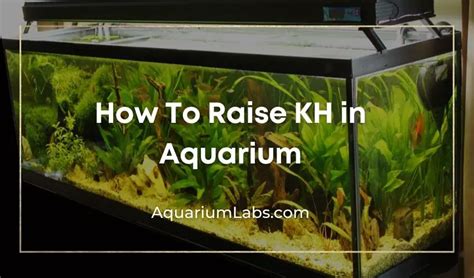How To Raise Kh In Freshwater Aquarium
Ronan Farrow
Mar 25, 2025 · 3 min read

Table of Contents
How to Raise KH in a Freshwater Aquarium: A Comprehensive Guide
Maintaining the right water parameters is crucial for a thriving freshwater aquarium. One of the most important is carbonate hardness (KH), which acts as a buffer, preventing drastic pH swings that can stress or kill your fish. This guide will walk you through understanding KH and several effective methods to raise it in your aquarium.
Understanding Carbonate Hardness (KH)
KH, also known as carbonate alkalinity, measures the water's ability to resist changes in pH. It's expressed in degrees of KH (dKH) or parts per million (ppm). A low KH makes your aquarium vulnerable to pH fluctuations, potentially leading to ammonia spikes and harming your aquatic life. Ideally, your freshwater aquarium should have a KH between 4 and 8 dKH.
Why is KH Important?
- pH Stability: A higher KH provides a buffer, preventing dramatic pH drops.
- Ammonia Control: Helps neutralize ammonia, a toxic compound.
- Plant Growth: Many aquatic plants thrive in a slightly harder water.
- Fish Health: Many fish species prefer a stable and slightly harder water environment.
Methods to Raise KH in Your Freshwater Aquarium
There are several safe and effective ways to increase KH in your aquarium. Here's a breakdown of common methods:
1. Using Baking Soda (Sodium Bicarbonate)
Baking soda is a readily available and cost-effective option to raise KH. It's a pure form of sodium bicarbonate, which directly contributes to the carbonate hardness.
- How to use it: Dissolve a small amount of baking soda in a separate container of aquarium water before adding it slowly to your tank. Start with small amounts and test the KH after each addition to avoid drastic changes. Use an aquarium water test kit to monitor the KH levels accurately.
- Caution: Add baking soda gradually, and carefully monitor your aquarium's pH after each addition. Too much baking soda can lead to undesirable pH increases.
2. Employing Seachem Alkaline Buffer
Seachem Alkaline Buffer or similar products are specifically designed to raise KH and maintain a stable pH. These are usually more reliable options.
- How to use it: Follow the manufacturer's instructions carefully. They often provide a dosage guide based on your aquarium size and desired KH increase.
- Advantages: These buffers usually contain a blend of minerals carefully balanced for aquarium use, leading to precise KH adjustments.
3. Adding Crushed Coral or Aragonite
These natural materials gradually release minerals into the water, increasing both KH and GH (general hardness).
- How to use it: Place small amounts of crushed coral or aragonite in a filter media bag and place it in your filter. This method provides a slower, more natural increase in KH.
- Advantages: This offers a long-term solution for KH maintenance.
4. Utilizing Liquid KH Boosters
These commercial products are specifically formulated to raise KH.
- How to use it: Follow the instructions provided by the manufacturer. The dosage will vary depending on the product and your aquarium size.
- Advantages: Easy to use and provide a quick increase in KH.
Monitoring KH Levels
Regular monitoring of your KH levels is crucial. Use a reliable aquarium water test kit to accurately measure KH and other important water parameters. This allows you to make timely adjustments and prevent potentially harmful fluctuations.
Choosing the Right Method
The best method for raising KH depends on your individual needs and preferences. Consider the following:
- Speed of KH increase: Baking soda offers a quick increase, while crushed coral provides a slower, more gradual rise.
- Convenience: Liquid KH boosters are easy to use, while crushed coral requires more effort.
- Cost: Baking soda is the most economical option.
- Long-term effects: Crushed coral or aragonite is excellent for long-term KH maintenance.
By understanding the importance of KH and employing the right methods, you can maintain a healthy and thriving freshwater aquarium. Remember to always test your water regularly and make adjustments gradually.
Featured Posts
Also read the following articles
| Article Title | Date |
|---|---|
| How To Polish Bald Head | Mar 25, 2025 |
| How To Love Yourself After Breakup | Mar 25, 2025 |
| How To Produce The Ch Sound | Mar 25, 2025 |
| How To Paint Storm Door | Mar 25, 2025 |
| How To Layer Resin Without Lines | Mar 25, 2025 |
Latest Posts
Thank you for visiting our website which covers about How To Raise Kh In Freshwater Aquarium . We hope the information provided has been useful to you. Feel free to contact us if you have any questions or need further assistance. See you next time and don't miss to bookmark.
